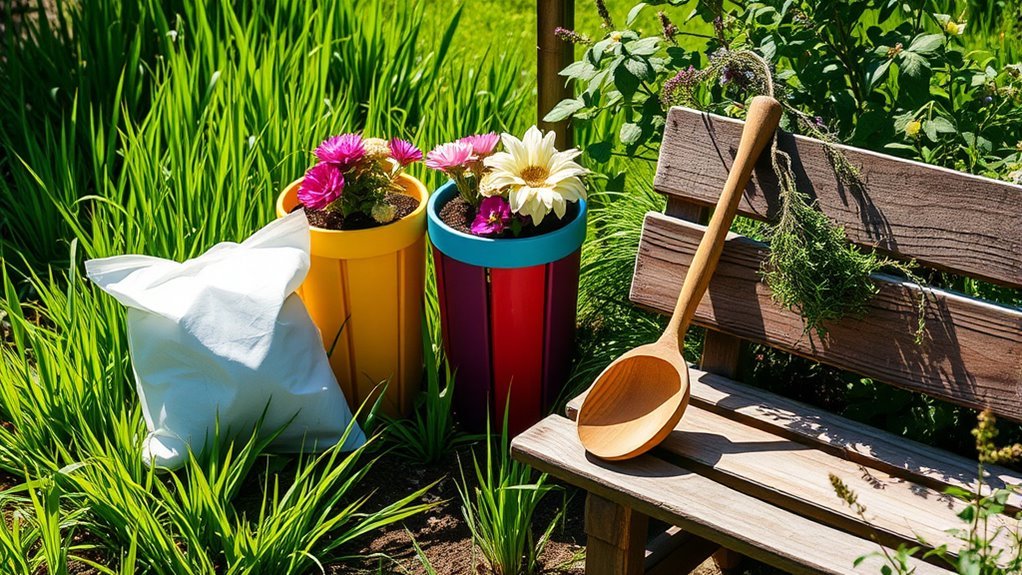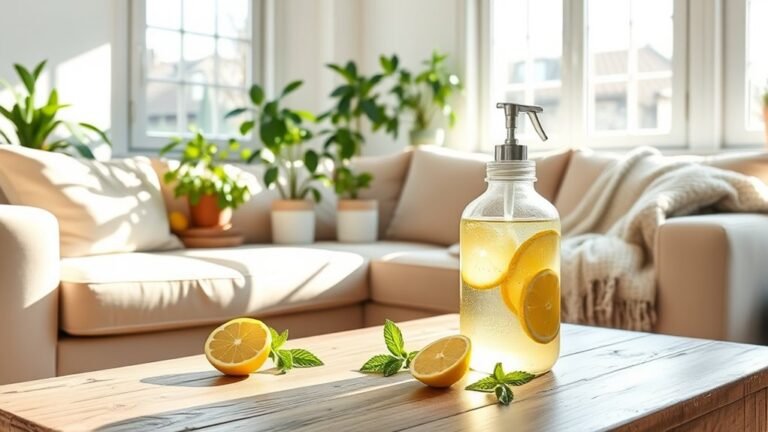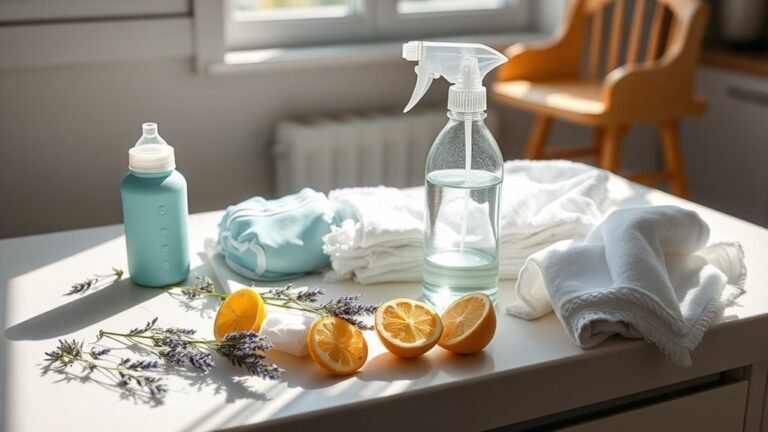Natural Alternatives to Pet Mess
If you want safe, natural alternatives to handle pet messes, try using household items like baking soda to absorb odors and vinegar mixed with water for effective stain removal. Natural enzymatic cleaners break down organic stains without harsh chemicals, keeping your space fresh and pet-friendly. You can also use gentle essential oils like lavender for odor control and adopt sustainable waste practices. Discovering more eco-friendly tips can help you protect both your home and furry friends.
Benefits of Using Natural Cleaning Products for Pets
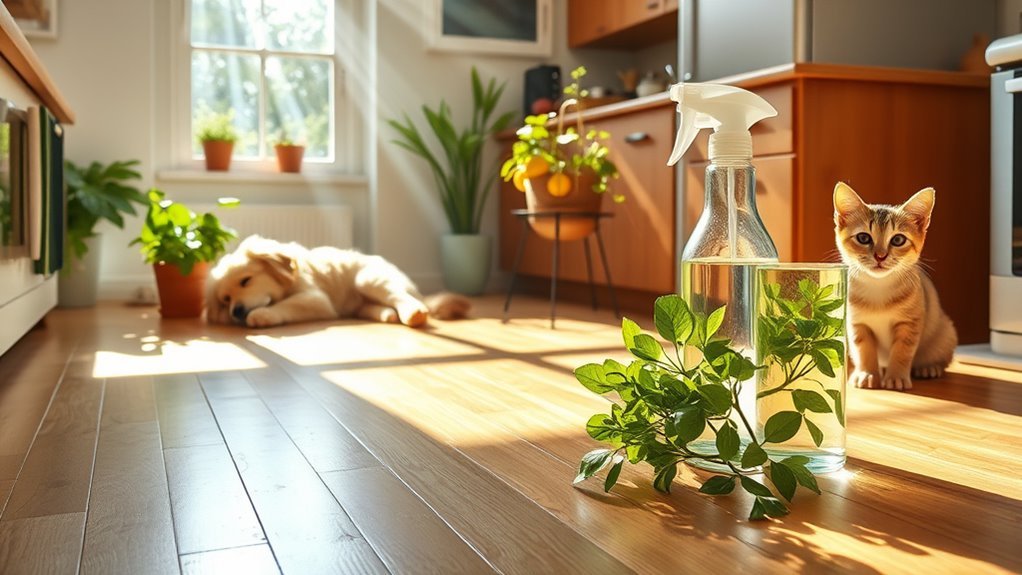
Although it might be tempting to reach for conventional cleaners, using natural cleaning products for your pet’s messes offers clear benefits. When you choose cleaners made with natural ingredients, you’re not only protecting your home environment but also prioritizing pet safety. Harsh chemicals can linger, causing irritation or even harm to your furry friends. By opting for natural alternatives, you reduce exposure to toxins, giving your pets a healthier space to roam freely. Plus, these products often break down more easily, minimizing environmental impact. Embracing natural cleaning solutions means you’re reclaiming control over what touches your home and your pets, creating a safer, more liberated lifestyle for everyone involved. It’s a simple choice that keeps both your pets and your conscience clear.
Common Household Ingredients for Pet Mess Cleanup
When dealing with pet messes, you don’t need fancy products to get the job done. Simple, common household ingredients can be powerful allies in your cleanup routine. Baking soda freshens up odors, while salt can help absorb liquids. Dish soap cuts through grease and grime gently but effectively. Lemon juice adds a natural antibacterial punch, perfect for tackling stains. These ingredients form the foundation of many homemade solutions that are safe for your furry friends and your home. By using these pet friendly recipes, you maintain a clean space without exposing your pets to harsh chemicals. Embracing these easy, natural options gives you the freedom to clean confidently, knowing you’re protecting both your family and the environment.
How to Make a Vinegar-Based Cleaning Solution
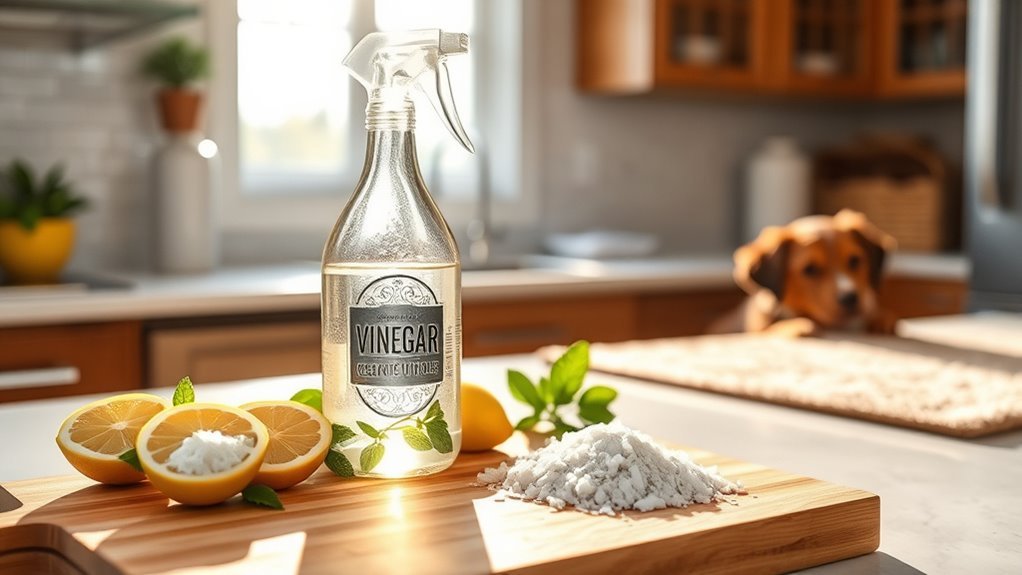
You can easily whip up a vinegar-based cleaning solution with just a few simple ingredients like white vinegar, water, and a bit of baking soda. Knowing the right proportions and how to apply the mixture will make your cleanup more effective. Let’s go over what you’ll need and the best ways to use it on pet messes.
Vinegar Solution Ingredients
Three simple ingredients form the basis of an effective vinegar-based cleaning solution for pet messes. You’ll need white distilled vinegar, water, and a touch of baking soda. White vinegar is your best bet due to its strong acidity and neutral scent, but you can explore other vinegar types like apple cider vinegar if you prefer a milder aroma.
Getting your solution ratios right is key: mix one part vinegar with one part water to balance strength and safety. Add a tablespoon of baking soda for extra deodorizing power, but add it carefully to avoid fizzing over. This combination frees you from harsh chemicals while tackling odors and stains naturally, letting you clean confidently and sustainably.
Cleaning Application Tips
Mixing the vinegar, water, and baking soda is just the start; knowing how to apply the solution makes all the difference in tackling pet messes effectively. To maintain pet hygiene and streamline your cleaning routines, apply the solution directly to the affected area, let it sit for a few minutes, then blot gently with a clean cloth. Avoid scrubbing harshly to protect surfaces and your pet’s comfort.
| Step | Action |
|---|---|
| 1. Apply | Spray solution on the mess |
| 2. Wait | Let sit for 5-10 minutes |
| 3. Blot & Dry | Gently blot with cloth, air dry |
Following these tips guarantees a natural, effective method that respects your pet and your freedom from harsh chemicals.
Using Baking Soda to Neutralize Pet Odors
You can use baking soda to effectively neutralize pet odors because it absorbs and breaks down smells at the source. Simply sprinkle it on carpets or pet bedding, let it sit for a while, then vacuum it up for fresh results. Just be sure to keep it out of your pets’ reach to avoid any accidental ingestion.
How Baking Soda Works
Although pet odors can be stubborn, baking soda offers a simple and effective way to neutralize them. You’ll appreciate how baking soda works by absorbing moisture and trapping odor-causing molecules, rather than just masking smells. This natural powder’s benefits go beyond just odor control—it’s non-toxic and safe around your pets, giving you freedom from harsh chemicals. The versatility of baking soda applications means you can sprinkle it on carpets, pet bedding, or litter boxes to refresh your space effortlessly. When you rely on baking soda, you’re choosing a straightforward, eco-friendly solution that tackles pet messes at their source. Embracing its power lets you maintain a fresh home without compromising your pets’ or your own well-being.
Application Tips for Odors
When tackling pet odors with baking soda, applying it correctly makes all the difference. First, sprinkle a generous layer of baking soda directly onto the affected area—carpets, upholstery, or litter boxes—then let it sit for at least 15 minutes, or overnight for stronger smells. This allows the powder to work its magic through proven odor absorption techniques, trapping unpleasant smells naturally. Afterward, vacuum thoroughly to remove the baking soda along with the absorbed odors. Remember, using baking soda fits perfectly into natural deodorizing methods, giving you a chemical-free way to reclaim your space. By mastering these application tips, you’ll enjoy fresher surroundings without harsh sprays or artificial fragrances, keeping your home and pets happy and free from lingering mess odors.
Safety Around Pets
Since baking soda is generally safe but can cause mild irritation if ingested in large amounts, it’s important to use it carefully around your pets. You want to maintain pet safety without restricting their freedom. Always apply baking soda in areas your pets can’t easily reach, and practice pet supervision during and after application to avoid accidental ingestion.
| Concern | Your Freedom Solution |
|---|---|
| Pet curiosity | Use baking soda when pets are elsewhere |
| Accidental eating | Supervise pets until powder settles |
| Irritation risk | Apply lightly and vacuum promptly |
| Safety assurance | Choose natural, non-toxic alternatives |
Natural Enzymatic Cleaners and How They Work
Natural enzymatic cleaners use powerful biological agents to break down pet messes at their source. When you apply these cleaners, enzymes target and digest organic materials like urine, feces, and vomit through enzymatic breakdown. This process not only removes visible stains but also eliminates the root cause of odors. Unlike harsh chemicals, these cleaners achieve effective odor neutralization by transforming smelly compounds into harmless substances. Using them gives you freedom from strong fumes and risky residues, making your space safer for both you and your pets. Plus, they work on a variety of surfaces without causing damage, so you don’t have to worry about harming your floors or furniture. Choosing natural enzymatic cleaners means embracing a cleaner, fresher home without compromising your values or your pet’s well-being.
Eco-Friendly Tools for Cleaning Pet Hair and Dander
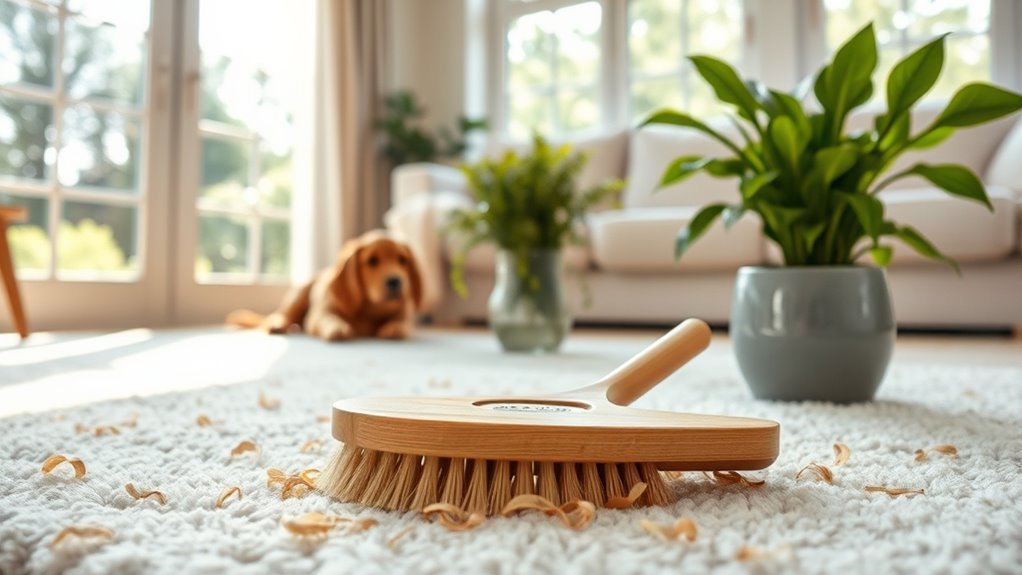
Three eco-friendly tools can make managing pet hair and dander much easier without harming the environment. First, eco friendly brushes crafted from natural materials help you effortlessly lift and collect pet hair while avoiding plastic waste. Next, sustainable vacuums powered by energy-efficient motors and equipped with reusable filters reduce electricity use and landfill contributions. These vacuums are designed to tackle pet dander deeply embedded in carpets and upholstery without relying on disposable bags. Finally, reusable lint rollers with washable adhesive surfaces save money and cut down single-use waste. By choosing these tools, you’re not just keeping your space clean—you’re embracing freedom from harmful chemicals and excessive waste. This approach lets you care for your pets and your planet simultaneously, making cleanup a simple, responsible habit.
Tips for Preventing Pet Stains Naturally
Although pet stains are often inevitable, you can take simple steps to minimize their impact on your home. Start by choosing stain resistant materials for your furniture and rugs—these make cleanup easier and protect your belongings. Implement preventive measures like training your pets to use designated areas and promptly addressing accidents to stop stains from setting. Keep a supply of natural cleaning solutions handy to tackle messes quickly. Regular grooming reduces shedding and prevents dirt buildup, which can contribute to stains. By combining these practical tips, you maintain a fresh, inviting space without sacrificing your freedom to enjoy life with your pets. Taking control with these natural strategies means fewer stains and more time savoring the companionship you cherish.
Safe Essential Oils for Pet Odor Control
When you’re dealing with pet odors, choosing the right essential oils can make a big difference without exposing your furry friends to harmful chemicals. You want to keep pet safety front and center, so avoid oils like tea tree or eucalyptus, which can be toxic. Instead, opt for gentle options such as lavender, chamomile, or cedarwood. These essential oils not only help neutralize odors but also create a calming environment for your pets. Use them sparingly—diluted in water or a carrier oil—and never apply directly to your pet’s skin. By selecting safe essential oils, you maintain a fresh home while respecting your pet’s well-being, giving you the freedom to enjoy a clean space without compromising their health.
Sustainable Practices for Managing Pet Waste
If you want to reduce your environmental impact while managing pet waste, adopting sustainable practices is key. Start by switching to biodegradable bags—they break down naturally and cut down on plastic pollution. You’ll feel freer knowing you’re making choices that don’t harm the planet. Another great option is composting pet waste, but remember to use specialized composters designed for this purpose to avoid health risks. Composting transforms waste into useful soil, closing the loop sustainably. These steps not only keep your surroundings clean but also align with a lifestyle that values freedom and responsibility. By embracing biodegradable bags and composting pet waste, you’re taking control of your environmental footprint without sacrificing convenience or your love for your furry friend.
Frequently Asked Questions
Can Natural Cleaners Harm My Pet if Ingested?
You might wonder if natural cleaners can harm your pet if ingested. While natural ingredients are usually safer, you still need to evaluate pet safety seriously. Some plant-based cleaners contain essential oils or other substances that could be toxic to your furry friend. Always check cleaner ingredients carefully and keep products out of reach. That way, you’re free to maintain a clean home without risking your pet’s health.
How Often Should I Deep Clean Pet Bedding Naturally?
You should aim for a bedding frequency of deep cleaning about once every two weeks to keep things fresh and comfy for your pet. Using natural cleaning methods like vinegar and baking soda not only avoids harsh chemicals but also helps maintain a healthy environment. If your pet has accidents or allergies, you might want to increase the frequency. Staying consistent with these methods gives your furry friend freedom to relax without worries.
Are There Natural Alternatives for Flea and Tick Control?
You might think chemicals are the only way to fight fleas and ticks, but you’re freer than that. Essential oils like lavender or eucalyptus offer a gentle yet effective natural alternative. Herbal treatments, such as neem or rosemary, can repel pests without harsh toxins. By choosing these, you’re not just protecting your pet—you’re embracing a lifestyle that values freedom from synthetic chemicals and respects nature’s power.
Can Natural Cleaning Products Be Used on All Pet Types?
You can often use natural cleaning products safely, but it really depends on the pet types you have. Some animals, like cats, are more sensitive to certain ingredients, so you’ve got to check for cleaning safety first. Always read labels and avoid anything with essential oils harmful to pets. When in doubt, test a small area or consult your vet to keep your furry friends safe while enjoying a clean home.
What Are the Best Natural Remedies for Pet-Related Allergies?
When it comes to tackling pet dander and allergy symptoms, you’ll want to nip the problem in the bud. Using natural remedies like air purifiers with HEPA filters, regular vacuuming, and washing your pet’s bedding frequently can make a huge difference. You might also try saline nasal sprays or local honey to boost your immune system. These steps help you breathe easier and enjoy freedom with your furry friends without the sniffles.
